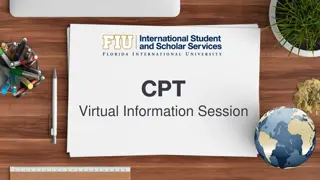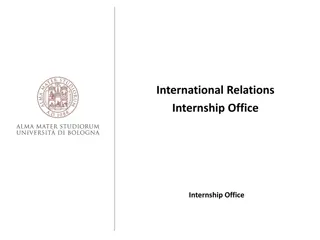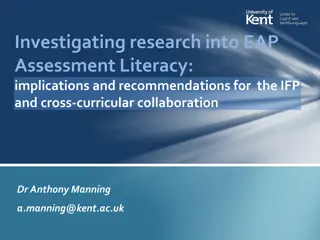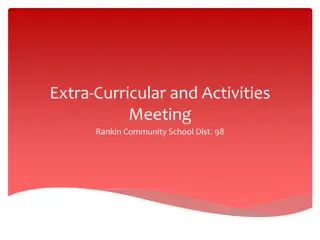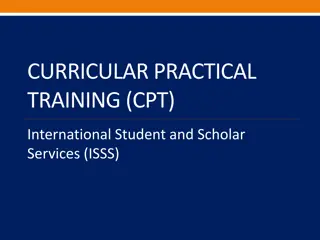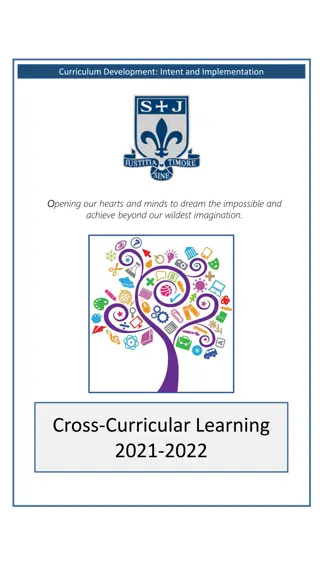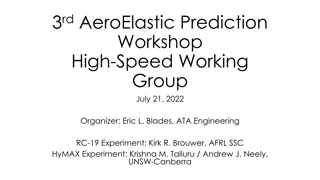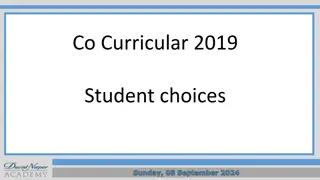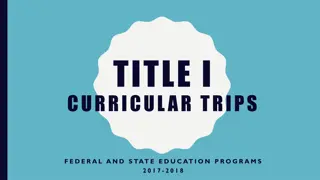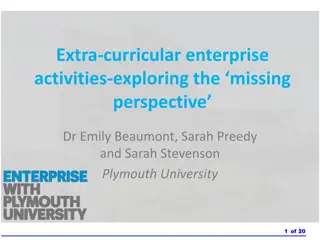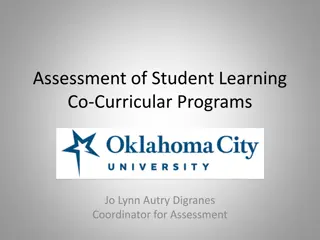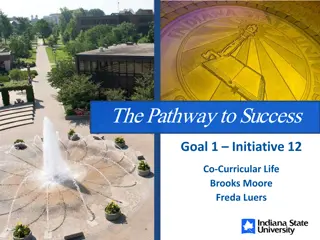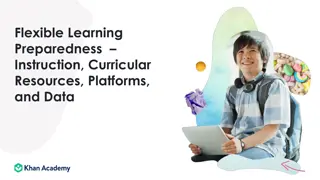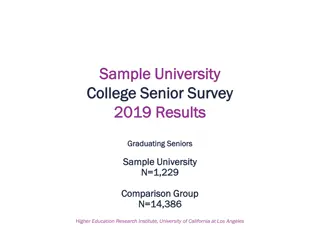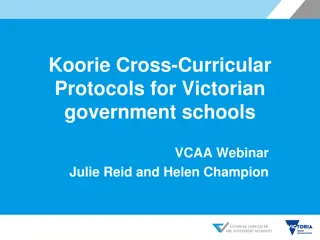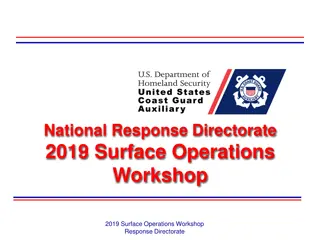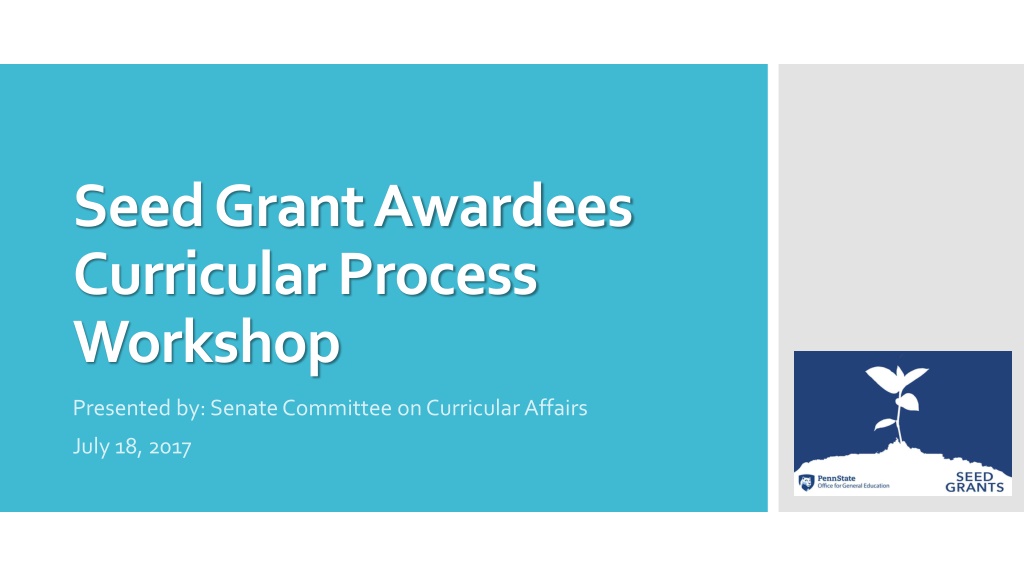
Understanding the Curricular Process and Workshop for Seed Grant Awardees
Explore the detailed process of turning proposals into courses, including curricular review, approval, and the role of the Senate Committee on Curricular Affairs. Discover the crucial steps involved in obtaining special designations for courses, such as General Education and Integrative Studies. Utilize resources provided by your SCCA representative for a successful course development journey.
Download Presentation

Please find below an Image/Link to download the presentation.
The content on the website is provided AS IS for your information and personal use only. It may not be sold, licensed, or shared on other websites without obtaining consent from the author. Download presentation by click this link. If you encounter any issues during the download, it is possible that the publisher has removed the file from their server.
E N D
Presentation Transcript
Seed Grant Awardees Curricular Process Workshop Presented by: Senate Committee on Curricular Affairs July 18, 2017
Turning a Proposal into a Course (with an emphasis on GenEd/ Integrative Studies) Congratulations, Seed Grant Awardees! Curricular Work Flow Curricular Review & Approval Process Includes New Course/ Change to an Existing Course Curricular Proposal Preparation
Curricular Work Flow From Faculty Development to Senate Approval
Curricular Review & Approval Process Senate Approval New Course/ Change to an Existing Course
What we do in SCCA Review ALL (adds, drops, changes, recertifications) undergraduate course and program proposals Subcommittees oversee approvals for General Education, Integrative Studies, Bachelor of Arts, United States and International Cultures, Writing, and Retention and Transfer. Senate Committee on Curricular Affairs (SCCA) Develop criteria for evaluating proposals Study courses/ curricular offerings to recommend changes as appropriate to meet the needs of students
Your SCCA Representative is a Resource SCCA has a representation for each College at University Park, University College, and each of the stand-alone campuses. The SCCA representative: Thoroughly reviews proposals during the signatory process. Serves as a liaison between the College and the SCCA. Assists in resolutions of issues when they arise. Your SCCA Representative SCCA Membership can be found on the Senate website: http://senate.psu.edu/senators/standing- committees/curricular-affairs/members/
The Senate Office Receives the Proposal IF the course is NOTseeking a special designation (Gen Ed, Integrative Studies, BA, US/IL, or Writing), the course proposal is placed directly on the next Senate Curriculum Report to be reviewed at the next SCCA meeting. IF the course ISseeking a special designation, the course proposal is sent to the appropriate subcommittee(s) for review to review the special designation. IF the special designation is approved, the course is placed directly on the next available Senate Curriculum Report. The special designation(s) is/are no longer debatable. IF the special designation is rejected or questioned, the course is returned to the proposer(s) for resubmission or clarification. * The subcommittee is ONLY debates the designation. The course is still reviewed in the full SCCA membership. SCCA Review of Course Proposals
CURRICULUM REPORT PUBLICATION DATE CURRICULUM PROPOSALS DUE SCCACOMMITTEE MEETINGS Curricular Deadlines for 2017-2018 August 4, 2017 August 22, 2017 September 12, 2017 September 15, 2017 October 3, 2017 October 17, 2017 October 27, 2017 November 14, 2017 December 5, 2017 December 15, 2017 January 9, 2018 January 23, 2018 February 2, 2018 February 20, 2018 March 13, 2018 March 23, 2018 April 10, 2018 April 24, 2018 http://senate.psu.edu/senators/important-dates/
Curricular Proposal Preparation Proposal Submission (curriculum.psu.edu) Consultation
Faculty Develop Curriculum All curriculum starts with the faculty. For curriculum to change or be developed, faculty must initiate the process. All Curriculum is Faculty-Driven
The Curriculum System Course proposals are created and vetted through the Course Review and Consultation System (CRCS) (www.curriculum.psu.edu) CRCS will take you through the steps in entering a proposal and will identify all required fields (which will differ based on GenEd domain selection/ if Integrative Studies is chosen). Course Review & Consultation System (curriculum.psu.edu)
A Complete Course Proposal Has: Been submitted via www.curriculum.psu.edu A clear description of the course content An outline of course topics including time allotment Evidence of adequate and complete consultation Been well justified Adequately completed all required proposal fields, addressing all components/questions An uploaded sample syllabus (if Gen Ed or Writing) A Complete Course Proposal
Components of the Sample Syllabus A sample syllabus must be uploaded at the time of course submission and must include: Course abbreviation, course number, credit value Prerequisites/ Co-requisites/ Concurrent Requirements/ Recommended Prep Course Attributes/Designations (i.e. GA, Inter-domain, etc.) General Education Learning Objectives Course Description (and other critical content) Course Learning Objectives The Sample Syllabus The current sample syllabus template can be found on the Office for General Education website: https://gened.psu.edu/sites/default/files/docs/Syllabus% 20Information.pdf
Tips for Success by Navigation Section Course Designation: be sure to click Gened Recert if existing course Course Offering History: lists campuses where the course has been offered over the past 4 years; should help proposer develop at least a portion of a consultation list Course Information: must indicate General Education under Learning Attributes Additional Course Information: indicate all preparation (if applicable) and cross-listings Course Outline: provide outline with time allotment; update the course description (if existing) Justification: address all areas GenEd Requirements: select 2-4 GenEd Learning Objectives (GELOs); partition answers by objective when addressing the components of the course are related to achieving GELOs. Knowledge Domain Crit: select 3-5; address question (for each domain); address integrative studies questions if applicable Required Signatories: enter Department Head (others should populate) Consultation: enter consultants and submit request for Consultation *Click Send Proposal to Next Workflow Step when ready Entering a Proposal for Gen Ed
Consultation is Required The purpose of consultation is to ensure all units affected by an addition to or proposed change in curriculum have the opportunity to voice concerns and/or suggest improvements. Consult with: all campuses where course has been taught in the last 4-5 years (change/recertification) all campuses departments/programs delivering similar content (new ) all departments/programs/campuses affected by a change (i.e. content, a prereq, a program requiring that course) disciplinary communities who may share content (i.e. sustainability affects many) or may have duplication librarians (resources) Consultation
Linked Inter-Domain Need to justify the presence of content appropriate for a 50/50 split of 2 domains Consultation needed with appropriate faculty in both domain disciplines Course reviewed in GenEd and Integrative Studies Subcommittees. *Can extend time to approval. Suffix of N can be used at time of proposal submission to easily identify an inter-domain course. Need to submit EACH course to approve the single domain on a course Proposals would also include the linkage between the two courses Integrative Studies Courses Consultation needed for each course in domain discipline and consultation to support the linkage(s) Courses each reviewed in GenEd and Integrative Studies Subcommittees. *Can extend time to approval. Suffix of Z can be used to easily identify a linked course. *May want to propose a non-Z version for flexibility in offering
Inter-domain Courses Every proposal is different in content, structure, and vision. You will need to address the following: f) Explain how the intellectual frameworks and methodologies of the two Knowledge Domains will be explicitly addressed in the course and practiced by the students. Explanations of how students will address/integrate material and detailing the concepts/ topics addressed by each domain; descriptions of translating information to practice g) Demonstrate that each of the two domains will receive approximately equal attention, providing evidence from course topics, assignments, or other course components, and that students will integrate material from both domains. Explanations of how students will integrate material and detailing the concepts/ topics addressed by each domain Integrative Studies Prompts h) Include evidence of unit-level (department, program) and College-level administrative approval of the course, and evidence of substantive consultation among faculty with expertise in the appropriate Knowledge Domains and discipline(s). Widespread consultation on record i) Where Inter-Domain courses are cross-listed, consultation with both of those academic units and their Colleges is required. For other Inter-Domain courses, given that all the Knowledge Domains are offered by more than one unit and College, this dual-Domain consultation and support should occur with the most closely related units and Colleges (more than one such unit and College may be relevant). Widespread consultation on record j) Briefly explain the staffing plan. Given that each Inter-Domain course is approved for two Knowledge Domains, it will be taught by an instructor (or instructional team) with appropriate expertise in both domains. For durability, addressing knowledge base, skills, and/or abilities and qualifications of an instructor would be preferable to naming an individual (s). This plan may include notations of communication among the affected units and collaborations with campus personnel likely to offer the course. k) Describe the assessments that will be used to determine students ability to apply integrative thinking. Without only naming assignments, discuss HOW assessment method(s) show application of integrative thinking (i.e. portions of a final project that require x )
Linked Courses Every proposal is different in content, structure, and vision. You will need to address the following: f) Explain how the intellectual frameworks and methodologies of each course s Knowledge Domain will be explicitly addressed in the course and practiced by the students. Explanations of how students will address/integrate material and detailing the concepts/ topics addressed by each domain; descriptions of translating information to practice g) Explain how the courses in the Linkage will be linked with each other. It is anticipated that courses will usually be linked by subject matter, but they should additionally be linked by some purposeful component that provides opportunities for students to experience and practice integrative thinking across Knowledge Domains. The Linkage component between courses needs to be intentional and explicit to students. However, each course in a Linkage must be self-contained such that students can successfully complete just one course in the Linkage if they so choose. Show specific linkages that can be drawn between material in both courses h) Include evidence of unit-level (department, program) and College-level administrative approval of the courses and Linkages, and evidence of substantive consultation among faculty with expertise in the appropriate Knowledge Domain(s) and discipline(s). Widespread consultation on record Integrative Studies Prompts i) Briefly explain the staffing plan. Given that each Linked Course is approved for a single Knowledge Domain, it will be taught by an instructor (or instructional team) with appropriate expertise in that domain, who will also be expected to implement the Linkage s shared component as defined in the proposal. For durability, addressing knowledge base, skills, and/or abilities and qualifications of instructors would be preferable to naming an individual(s). This plan will include notations of communication strategies among the affected units and collaborations with the other instructor and campus personnel likely to offer the course. j) Describe the assessments that will be used to determine students ability to apply integrative thinking. Without only naming assignments, discuss HOW assessment method(s) show application of integrative thinking (i.e. portions of a final project that require x ) and reinforcing information between the courses
Thank you for attending the session today, and a hearty Congratulations on your Seed Grant! Michele L Duffey, SCCA Chairperson (2017-2018) mlp127@psu.edu

